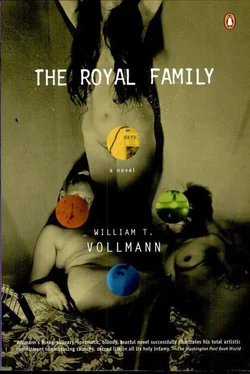And then Irene had taken her own life. Celia’s arrangement became quite different. In so many situations which we pretend merely to endure, the lightning-flash of sudden change will often reveal to us our own desperate involvement and investment. Celia loved John, or had come to love him, she knew not how or when. She had wandered entirely into his shadow. She trusted him no more than before, but the hope which Irene’s permanent absence now gave her proved that John possessed the power to disappoint her after all, that she’d fallen into his keeping.
John could hardly be called gentle, but he did own what gentle natures often lack: namely, the power of steadiness. When he made a promise to Celia, he generally kept it. What if she could render him trustworthy after all? Could she persuade him to promise to be hers less precariously? She was anxious; she wanted children; her previous boyfriends had never been particularly kind, perhaps on account of some particular quality of hers; and so the fact that John was not kind, either, became less of a liability than it might have been for another woman. And in fact he was capable of kindness in his offhand, self-protective way. Call Celia loyal or call her lazy, the truth is that she couldn’t bear to look for anyone else.
Your father would like this mug, John said.
Excuse me, said Celia, but how do you know what mug my father would like? He’s a specific person. He likes specific things. He’s actually very difficult to shop for.
Whatever, said John, handing the mug to the salesgirl. We’ll take this, please.
The infuriating thing was that John was right. Celia’s father loved the mug. John often had the talent of knowing others’ tastes. He thought that he always had it. Actually, it operated most reliably with people he barely knew. Celia, Irene and Henry had all found his gifts to them to be disappointingly impersonal.
Let’s get him this dictionary set, Celia said enthusiastically.
No, said John. I don’t want any nephew of mine to turn into an egghead.
John came out of the elevator with a new black-and-gold necktie and his hand in his pocket. The white shirt he wore made the marble columns of the elevator bank look yellow. Rapp and Singer would not arrive for another hour. John had no desire for that emptiest of titles, The Earliest, and anyhow he wasn’t that; he simply had too much to do to waste his time sleeping. Moreover, it had become apparent from certain haggard words which Celia had let drop the previous night that the power struggle between them was about to resume. John had never gone so far as to assert that thanks to Irene’s suicide he was entitled to a vacation from what Californians loved to call “a serious relationship”; there was something so hopeless and helpless about Celia, and yet at the same time he could not bring himself to reject her, and he simply fucked her and went out to dinner with her, determined not to indulge anymore than he was compelled to in that sad vice called thinking. This could last only so long, as he was the first to admit. Once her anxiety had risen beyond a certain threshold, Celia would put a stop to their affair, which had outlived Irene only to exchange sordidness for dreariness.
Good morning, Joy, he said.
The secretary waved. Sitting by the phone, impatient, laughing, so amused by her interlocutor’s stupidity, she continued: No, no, no, no. I don’t want to do that. Wait. Wait. Wow. — Joy leaned forward very abruptly, stabbing with her finger. She loved to interrupt people to make them look at something. — But if I say it’s six-thirty, will I have to drive around the city with people? No, no. It always happens that I’ve been lucky and have been the last person to be picked up. But you already know. Oh, you don’t know. All right, all right, all right.
Smiling, she put the phone down and tapped John on his knee.
Let me guess, said John. Vacation.
How did you know?
Because if that were a work-related phone call, you’d get fired.
Joy wrinkled her nose and said: John, why are you always so mean?
Look, said John. You were talking like a client, not like an employee. That’s not mean; it’s obvious. You were talking the way Brady talks to me.
He does? He doesn’t respect you?
I’m actually quite busy now, Joy. What was it that you wanted?
Oh, forget it, said the girl sadly. I–I only…
John sighed and looked at his watch. — You know, Joy, your slip is showing. And another thing. Red is not your color. People would treat you better if you stopped wearing red. Now what was it?
Just go away, John, would you?
Although his manner remained the same, John had begun to feel uneasy. His psychic machinery busily transformed impatience into guilt. He neither believed that he had done anything wrong; nor did he recognize his own proclivity for reducing himself to vulnerability. Like most human beings, he categorized others as elect, worthless or menacing. Joy by virtue of her subordinate relation and what he perceived as her mediocrity could never be one of the elect. When he thought of her at all, it was as a marginally useful cipher. But a sense that he might have gone too far now urged him to reassign Joy, however temporarily, to the menacing category. He felt obliged to placate her. And so he said: Let me buy you a drink this evening, Joy. How about five-thirty? But I only have half an hour.
Just then Roland came by, very agitated, and said: They’ll see what they can do to us, mark my words.
Who’s being fired? said John, forgetting all about Joy.
Did you hear? Over at Synergetics, everybody who hired Ellen’s being fired. They fired Rich, and then they fired Mark, and then they fired Jackie Grazier… And so, let me get this straight. They never called you?
No, said John. But I got a call on my voicemail this morning.
Did you mean it? said Joy.
What? John said. Oh, sure. What did I say, five-fifteen? No, it’s going to have to be five-thirty. I can’t make it a second before then. Roland, tell me about it later. Grazier deserved whatever he got. Okay, now I need to put the Ibarra file to bed…
He had promised to call Celia at six. But as the drinks flowed, Joy was grabbing his knee again so happily and John, who ordinarily was square, smooth, clean and quiet like the lobby of one of those bank towers on California Street, found himself enjoying not Joy herself but his powers of attraction over her.
They were in the Tenderloin, fifteen minutes from the office by cab, at a downscale place Joy had heard about called the Wonderbar. Joy said that it was hip or cool or one of those words that she used, but all John cared to note about it was that two barstools down from them, a man was talking to himself. — Goddamnit, the man said. I can’t wash off that Mark of Cain. Fuck me fuck me God.
Sir, said Loreena the barmaid, would you please keep your voice down?
Fuck me fuck me God.
Sir, said Loreena, you’re having a schizophrenic episode. Tell those little green men in your head to take the night off.
John grimaced.
So do you think that the Polk Street look’s starting to invade the Tenderloin? said Joy quickly.
What do you mean?
I don’t know, I just… Look at that woman. Don’t you think she’s beautiful?
She’s not my type, said John.
That’s Chocolate, laughed Loreena, leaning over the bar, hungry for tips. She’s a prostitute, honey. Disposable babies is what she makes. She gives them all away. In four years she’s had four. Or is it eight? Can you believe it? I think somebody ought to take a shotgun to her.
So where was your vacation again? said John.
Читать дальше












